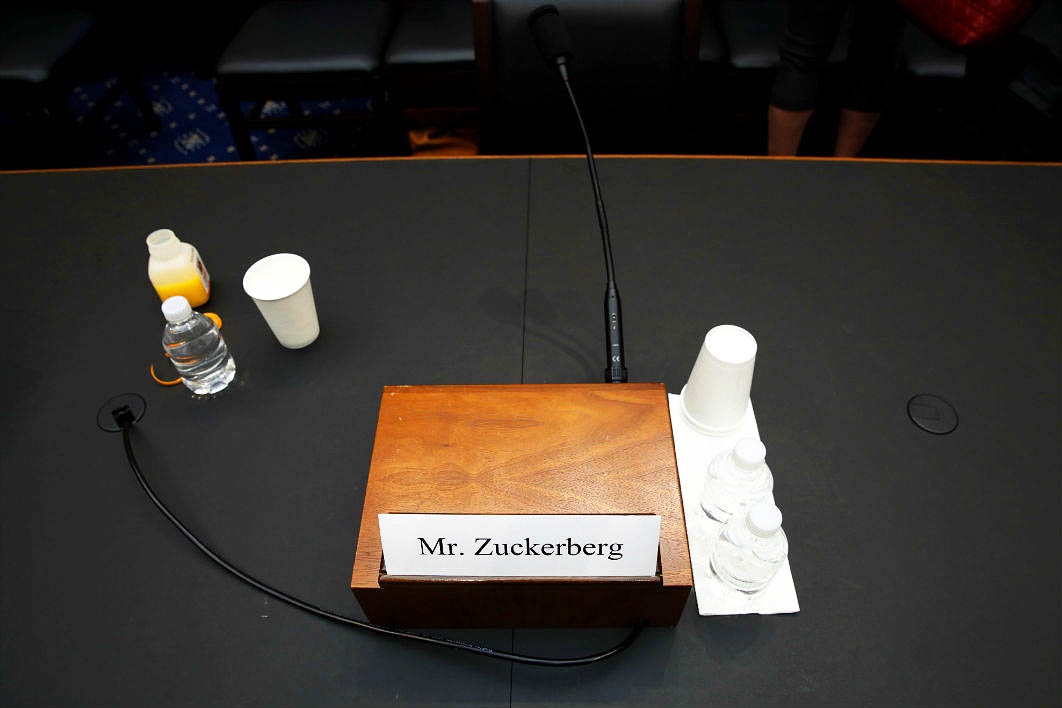Not since a publisher of note appeared before a bunch of politicians and uttered those immortal words, “this is the most humble day of my life,” have we seen such an apologetic stance from a media mogul. Sure, there was no cream pie in Mark Zuckerberg’s face as he testified before Congress over the Cambridge Analytica scandal earlier this month (though someone did dress up as a Russian troll) but, just like Rupert Murdoch, Zuckerberg had clearly rehearsed his sorry face. He played the dorky college kid who created Facebook in his dorm room to a tee and, just like Rupert, he even got away with feigning innocence about some of the goings-on in his own company.
But wait, I hear Sheryl Sandberg shuffling her familiar talking points: Facebook isn’t a publisher, and Zuckerberg’s not a media mogul.
Facebook has long maintained that it’s a tech company, not a media company, and doesn’t write the news that appears on the platform. The all-important implication is that, unlike a media company, Facebook needn’t take ultimate responsibility for what it distributes. But Zuckerberg let something slip in the hearing that he’d previously refused to acknowledge.
Just like Rupert Murdoch, the Facebook CEO was well prepped for his much-anticipated appearance before both houses of Congress. NBC reported that he took part in four mock hearings beforehand, and he sat on an elevated cushion (Twitter called it a “booster seat”) to create the right sense of authority. At one point he made the mistake of leaving his notes open long enough for an enterprising Associated Press photographer to snap a pic. They included answers crafted for difficult questions like Will you resign? (No, of course not) and Should Facebook be broken up? (No, that’ll help China). Problem was, none of these questions came up during the interrogation — if that’s what you call handballing the gazillionaire a series of soft questions while delivering a gentle massage to the temples.
The reason for the hearing? To grill Zuckerberg about social media data privacy in the wake of the Cambridge Analytica revelations. The topics covered? Facebook’s terms of service; social media addiction and our brains; foreign interference in elections; law enforcement access to data; illegal discrimination in advertising; the lack of diversity in the tech biz; hate speech; monopoly and competition; whether Facebook is listening to users’ conversations (nope); and, yes, the difference between platforms and publishers. Short of asking Zuckerberg to remind them what their password was, the senators covered pretty much everything with the lightest, most unilluminating line of questioning that could have been hoped for by one of the most powerful men in the world.
Sure, the wide-ranging nature of the questioning points to how Facebook has successfully penetrated almost every part of our lives. But its unfocused nature meant that Zuckerberg didn’t really reveal much that we didn’t already know. He did, however, drop one no-shit-Sherlock statement. “I agree we are responsible for the content,” he said. It seems like a reasonable and simple enough thing to say, but no one from the company has ever uttered those words before. And with good reason.
Zuckerberg tried to walk back from those comments later in the session. “I agree that we’re responsible for the content,” he said, “but we don’t produce the content.” He reiterated that he sees Facebook as a tech company, not a media company, but acknowledged that it has a certain responsibility to its users. That responsibility isn’t editorial in nature, he added.
What wasn’t contained in Zuckerberg’s notes was the admission that it’s much less complicated and much more lucrative to simply harvest the content of reputable mastheads, run it alongside material from disreputable hate sites, and claim you are merely distributing content curated by an algorithm.
Many of us in the media have watched for years now as Facebook has hoovered up our work and made millions off it, leaving crumbs for the actual publications that commissioned, funded and published the stuff. Facebook’s modus operandi also has grave and dangerous implications for any serious effort to fact-check, verify and effectively police hate speech. Never mind the fact that last year 99 per cent of all new ad revenue went to Facebook and Google. That’s ad revenue that used to pay for making news.
Admitting that Facebook is a media company would require Facebook to take responsibility for its role in the spread of fake news, propaganda and illegal Russian meddling in the US election. It opens the way for Facebook to be regulated in the way media companies are, and it would also make it harder to, say, enter the Chinese market.
In the course of his appearance before Congress, Zuckerberg came close to admitting that Facebook needed to address these links, and even conceded that some kind of regulation was inevitable.
But now that we’ve squeezed out that admission, it’s all a bit after the fact. News is in no way the main game for Facebook these days. It never really was. Earlier this year Zuckerberg announced changes to the platform’s newsfeed to prioritise posts from friends and family over content posted by news organisations and businesses. As BuzzFeed wrote in an internal memo after the announcement sent media companies into a panic spiral, “Facebook is breaking up with news.”
As the Cambridge Analytica scandal has reminded us, any users of this platform, whether they’re casual baby-spam uploaders or publishers trying to get more eyeballs, should know that they are entirely vulnerable to the whims of Facebook.
In many ways, we expect way too much of Mark Zuckerberg. He might aspire to be president these days, even pulling a Bill Gates move with his billions and hiring private pollsters to take the pulse of his popularity (or lack thereof), but let’s not forget that his first foray into software creation was Harvard’s Hot or Not. (For an entertaining/spine-chilling parlour game, read over the blog posts Mark Zuckerberg wrote while developing the Facemash software and then remind yourself that this is one of the most powerful people on Earth.)
Then again, maybe we don’t expect enough of him. Like basic accountability and transparency.
Yes, the number of Facebook users under twenty-five is declining. And yes, the company’s reputation has taken a hit. But it’s worth noting that the Avaaz petition calling on Zuckerberg to “fix Facebook” has had the most shares, by roughly five times any other outlet, on — yes — Facebook. That some of the US senators calling for action on data privacy livestreamed their questioning on, that’s right, Facebook Live. That the outstanding Observer coverage of Cambridge Analytica has been shared most widely on, yep, don’t make me say it. And finally, that in response to Zuckerberg’s appearance in Congress, Facebook shares saw their biggest one-day gain in nearly two years.
And, for all Zuckerberg’s promises to take users’ data concerns seriously, just days after he sat on his booster seat before Congress, Facebook moved more than 1.5 billion users, including Australians, out of reach of European privacy law, despite his promise to apply the “spirit” of the legislation globally.
The next step is to actually make a fuss about this stuff. The data problem isn’t exclusive to Facebook: the internet’s entire business model is built upon it. But Facebook is a handy target, and a high-profile one. More of us are getting our news from social media than ever before. Zuckerberg’s admission that Facebook is responsible for content should have implications for all internet platforms. But only if we care enough to demand it. ●




